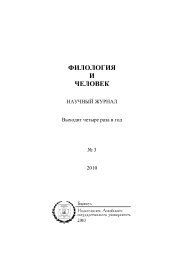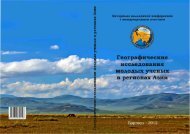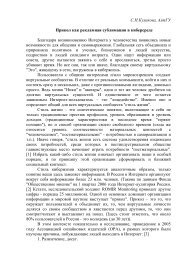Erasmus Mundus Action 1 Compendium 2009 - EACEA - Europa
Erasmus Mundus Action 1 Compendium 2009 - EACEA - Europa
Erasmus Mundus Action 1 Compendium 2009 - EACEA - Europa
You also want an ePaper? Increase the reach of your titles
YUMPU automatically turns print PDFs into web optimized ePapers that Google loves.
<strong>Erasmus</strong> <strong>Mundus</strong> Masters Courses<br />
LCT<br />
European Masters Program in Language and Communication Technologies<br />
Duration: 2 years<br />
Course description:<br />
The European Masters Program in Language and Communication Technologies (LCT) is designed to<br />
meet the demands of industry and research in a rapidly growing area. It offers education and training<br />
opportunities for the next generation of leaders in research and innovation. It provides students with<br />
profound knowledge and insight into the various disciplines that contribute to the methods of language<br />
and communication technologies and it strengthens their ability to work according to scientific<br />
methods. Moreover, the students also acquire practice-oriented knowledge by choosing appropriate<br />
combinations of modules in language technology, computational linguistics and computer science.<br />
The language of instruction is English (default).<br />
LCT consists of Core Modules and Specialised Modules in Language Technology (LT) and Computer<br />
Science (CS), complemented by a Project, and a Masters thesis, for a total of 120 ECTS credits.<br />
The Language Technology Core Modules (24 ECTS credits) include (a) the Foundational Module,<br />
which covers topics such as statistical methods, symbolic methods, cognition, corpus linguistics, text<br />
and speech, foundations of Linguistics, (b) the Computational Syntax and Morphology Module, which<br />
covers topics such as Finite State Techniques, probabilistic approaches, formal grammars, tagging,<br />
chunking, parsing, and (c) the Computational Semantics, Pragmatics and Discourse Module, which<br />
covers topics such as Syntax-Semantics Interface, semantic construction, dialogue, ontologies, formal<br />
semantics.<br />
The Computer Science Core Modules (24 ECTS credits) include (a) the Data Structures, Data<br />
Organisation and Processing Module, covering topics such as algebraic data-types, relational<br />
databases, semi-structured data and XML, Information Retrieval (IR), digital libraries, (b) the Logic,<br />
Computability and Complexity Module, covering topics such as logic and inference, automata theory,<br />
computability theory, complexity theory, discrete mathematics, and (c) the Formal Languages and<br />
Algorithms Module, covering topics such as formal grammars and language hierarchy, parsing and<br />
compiler design, search techniques and constraint resolution, automated learning.<br />
The Specialised Modules consist of 42 ECTS credits in LT and CS. These modules are based on the<br />
specific strengths in research and teaching of the partner institutions. From the 42 ECTS credits of this<br />
category of modules, 15 may be devoted to a project. The research masters thesis consists of 30<br />
ECTS credit points.<br />
The integrated study program is distributed among the Free University of Bozen-Bolzano (FUB), the<br />
University of Malta (UoM), the University of Nancy 2 (Nancy 2), the Charles University in Prague,<br />
Saarland University (UdS; Coordinator), and the University of Groningen (RuG).<br />
Students study at two universities and receive a double masters degree, which is officially recognised<br />
by the university authorities of all the partners. The awarded degrees are officially recognised degrees<br />
in the issuing countries. The program ensures that all students receive a common education that<br />
covers the core topics in LCT, but their specific scientific profile is shaped by the pair of Universities<br />
chosen for the first and second year of their studies.<br />
Applicants must satisfy the following study requirements: a Bachelor degree or equivalent in the area<br />
of (Computational) Linguistics, Language Technology, Cognitive Sciences, Computer Science,<br />
Mathematics, Artificial Intelligence, or other relevant disciplines; non-native speakers submit proof of<br />
knowledge of English such as the Toefl certificate (>79/550), or Cambridge Proficiency Exam (pass),<br />
or IELTS (>6.5).<br />
Website:<br />
http://lct-master.org<br />
Partners:<br />
Saarland University, Germany (Co-ordinating institution)<br />
Charles University of Prague, Czech Republic<br />
University of Nancy 2, France<br />
Free University of Bolzano – Bozen, Italy<br />
University of Malta, Malta<br />
University of Groningen, Netherlands<br />
90






